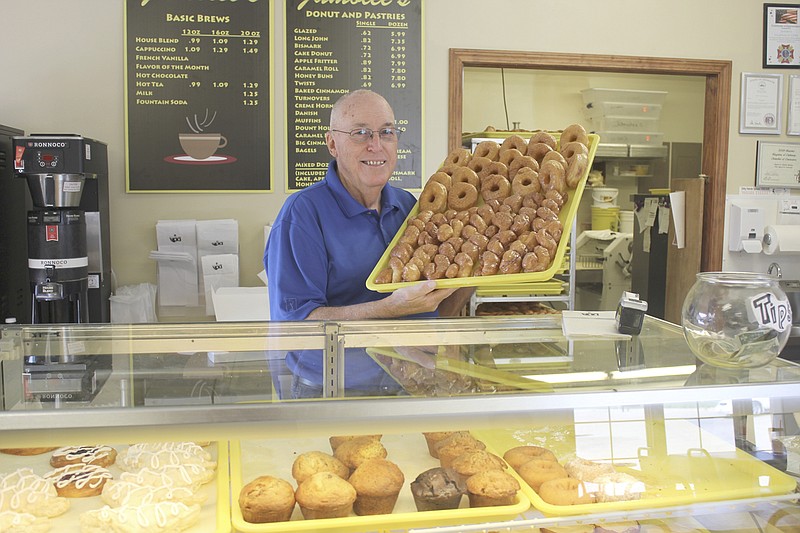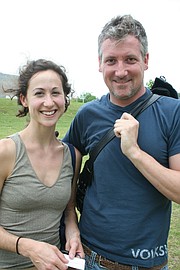We all had to start somewhere. In light of Labor Day, the Fulton Sun sought out some well-known figures in the community - people who have reached the peak or near the top of their career fields - to find out how it all began. We asked, "What was very your first job?"
LeRoy Benton
Though Fulton Mayor LeRoy Benton earned his first dollar mowing lawns, his true first job that launched a long career in entrepreneurship began when he was just 15, when he and his younger brother bought a donut shop in Farmington.
"We operated that until I left for college," Benton said. "My dad was in business and trading, and ... my brother thought it would be a good thing to do."
The brothers bought the shop, which they rechristened B and B Donuts, and began researching how to use their inherited equipment to make a tasty, consistent product. Soon they were successful enough to employ several friends in part-time positions.
"It was a lot of fun," Benton said. "We always had spending money, and it kept us out of trouble."
Benton and his staff would come in before school in the mornings to take excess donuts to the local grocery store to bring in extra earnings. He said one worker was able to buy a car with his savings, and it helped start a long career in business that included stints on the board of directors with Sanders Truck Line and President and CEO of Niedergerke Trucking.
That entrepreneurial business did come at a cost at times, however.
"I was on the basketball team, and when I was going to the game I dropped off a batch at the concession stand before I went to the locker room," Benton said. "The coach got really ticked off at me and put me on the bench for the first quarter because I wasn't focused on the game."
Bill Johnson
Director of Administration Bill Johnson has come a long way to oversee administrative functions for the city of Fulton.
In fact, the first job he ever had amounted to a hill of beans.
Johnson recalled working with friends to weed bean fields and prepare corn for fertilization in Iowa, starting around the time he was 12 years old.
"Most of my friends lived on farms and their parents needed help," Johnson said. "It's called "walking beans,' and when you do seed corn you have to pull the tassel off the female corn so the male can do the pollination."
Johnson said it was hard work and paid about 19 cents an hour to deal with heat and spiders, but to him, it was worth it.
"I loved it. It was something to do, it was a paycheck, and I worked with people I liked."
Johnson said doing farm work taught him skills that he uses to this day, such as attention to detail - missing one tassel could affect pollination of an entire row of corn - and determination.
"When you stepped onto into a bean field and looked across it to the other side, you know you could complete any task if you set your mind to it," he said.
Johnson eventually continued to work with one farmer and made enough to pay his way through college.
"He had a lot of cattle and farmed a lot of ground, but he was probably the best boss I ever had," he said. "I never felt like I was working for him; I felt like I was working with him."
Maj. Roger Rice
Maj. Roger Rice of the Fulton Police Department got his first job working at Wehrenberg Theaters in Fulton.
"I started to work at Fulton downtown theater and the drive-in during 1966 and continued to work there through high school and college. I loved every minute of it. I got to see as many movies as I wanted to see. I was up on all of the first-run movies," Rice said.
He worked in all jobs at the theater from the bottom up.
"I did janitorial work, sold tickets, worked the concession stand, and operated the film projectors. I did it all," Rice said.
During the 10 years he worked for the theater, Rice said he began to develop his people skills.
"I learned how to deal with and talk to people," Rice said. "I would chat with people attending the movies both before and after they watched the movie. In those days there were a lot of regular moviegoers. I would stand in the lobby and people would discuss movies with me."
Rice said meeting people at the theater was the best thing about the job.
"That's where I learned to deal with people. Unfortunately, many of the technical skills I learned are skills that nobody uses any more. Running the projection booth was an art. The trick was to do everything seamlessly from one film reel to the next," Rice said.
Reels of 35 millimeter movie film arrived at the theater enclosed in metal cans about 14 inches in diameter. Each movie required several reels. In addition, the projectionist had to assemble and edit reels of film for previews and other coming attractions.


